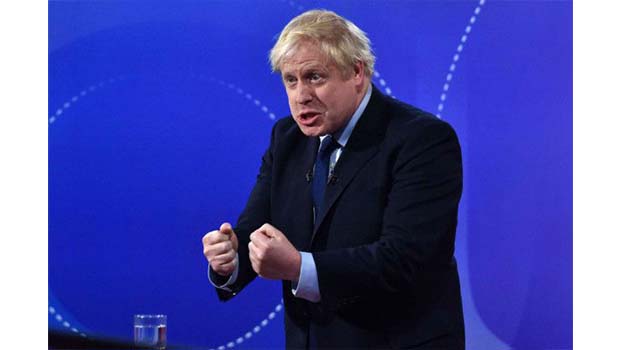Foreign policy beyond Brexit missing from UK poll agenda

The UK’s major political leaders, including Boris Johnson and Jeremy Corbyn, held on Friday night their first television hustings of the general election. What was striking, as has been true across the campaign so far, is lack of substantive discussion of UK foreign policy, beyond Brexit.
This underlines that, while a ginormous amount of attention in recent years has focused on the implications of the UK’s potential departure from the EU, comparatively little time has been spent on broader UK international policy. Indeed, the last time that the nation systematically reviewed its place in the world, beyond Europe, was 2015 with the-then National Security Strategy exercise and Strategic Defence and Security Review.
Almost a half-decade on, with the United Kingdom potentially on the cusp of leaving the Brussels-based club, a new foreign policy review is as urgent as it is necessary. And this is especially so given the scant attention paid to international issues in this year’s general election campaign.
The last decade has seen Britain lose its global influence at the fastest pace for years, despite the fact that it retains the fifth largest defence budget, the second largest aid budget and the fourth largest diplomatic network internationally. And this has happened because successive Conservative-led Governments have moved away from the world, rather than confidently embracing it.
It is a flawed approach that has weakened Britain and diminished its international standing. And this at a time when the UK faces a massive range of challenges from Russia’s stridency, to a continued terrorist threat.
In a previous generation, former Conservative foreign secretary Douglas Hurd asserted that Britain had been able to “punch above its weight” in the post-war era, despite it no longer being a great power. That statement may still be true today, but is under increasing scrutiny as the UK risks fading into what some have called foreign policy irrelevance.
The last decade has seen Britain lose its global
influence at the fastest pace for years, despite
the fact that it retains the fifth largest defence budget,
the second largest aid budget and the fourth
largest diplomatic network internationally
With the forthcoming scheduled exit of the EU, the Conservative government has asserted that it wants to rediscover the UK’s heritage “as a great global trading nation”, including with former parts of the British Empire and now-Commonwealth, such as India; plus other key emerging markets like China and the Gulf Cooperation Council states; and key industrialised countries such as Australia, Canada and the United States. To this end, London is agreeing new post-Brexit UK trade deals with dozens of countries, but this process is not straight forward.
Take the example of a potential new UK-US trade deal where there may be key areas ripe for agreement, including lowering or eliminating tariffs on goods, but potential disagreements too. This includes over harmonising financial services regulations, while other possible icebergs lie on the horizon too, not least given the president’s commitment to “America First”.
At the same time as these bilateral discussions are ongoing, the United Kingdom has also opened discussions with the 164-strong body of the WTO over post-Brexit terms of membership. The UK’s current membership is governed by its status within the EU with Brussels making commitments on trade tariffs and quotas on behalf of the 28 Governments.
The Government is seeking to replicate, as much as possible, the UK’s current schedule of WTO commitments. Upon leaving the EU, these obligations would serve as the baseline from which London would seek to negotiate new trade agreements.
While these WTO negotiations contain significant opportunity, they also have risk. For if the United Kingdom fails to achieve a new schedule of WTO commitments, the nation’s trading arrangements will be severely disrupted, with a proverbial cliff edge scenario a danger.
Outside of trade, Johnson has re-affirmed his vision that — post-Brexit — the United Kingdom will continue to play a major role in international security, including through its membership of Nato. While London will play a genuinely global role through continued membership of forums such as the UN Security Council, its continued commitment to Europe will also be very important going forward too.
He has sought to emphasise that while the United Kingdom is departing the EU, it is not leaving Europe. Instead, it is possible that London could continue, if not intensify, cooperation with EU partners in areas including crime, counter-terrorism and foreign affairs.
At this stage, the EU has not yet formally commented in great detail on wider post-Brexit security and foreign policy cooperation with the United Kingdom. However, it is likely that many national leaders, including in Germany, France and Eastern Europe will particularly favour a continued strong working relationship given the growing array of external security challenges facing the union.
This underlines that, ultimately, the issue of UK foreign policy is not just a burning issue for Britain, but also the rest of the world as if London no longer punches so strongly on the international stage it is also less able to bolster international security and prosperity at a time when both remain fragile. Continuing Britain’s proud traditions as a long-standing promoter of democracy, human rights and the rule of law long into the 21st century would be best secured by a different approach to UK foreign policy which the next government should seek to enable.
Andrew Hammond is an Associate at LSE IDEAS at the London School of Economics
—Gulf News




